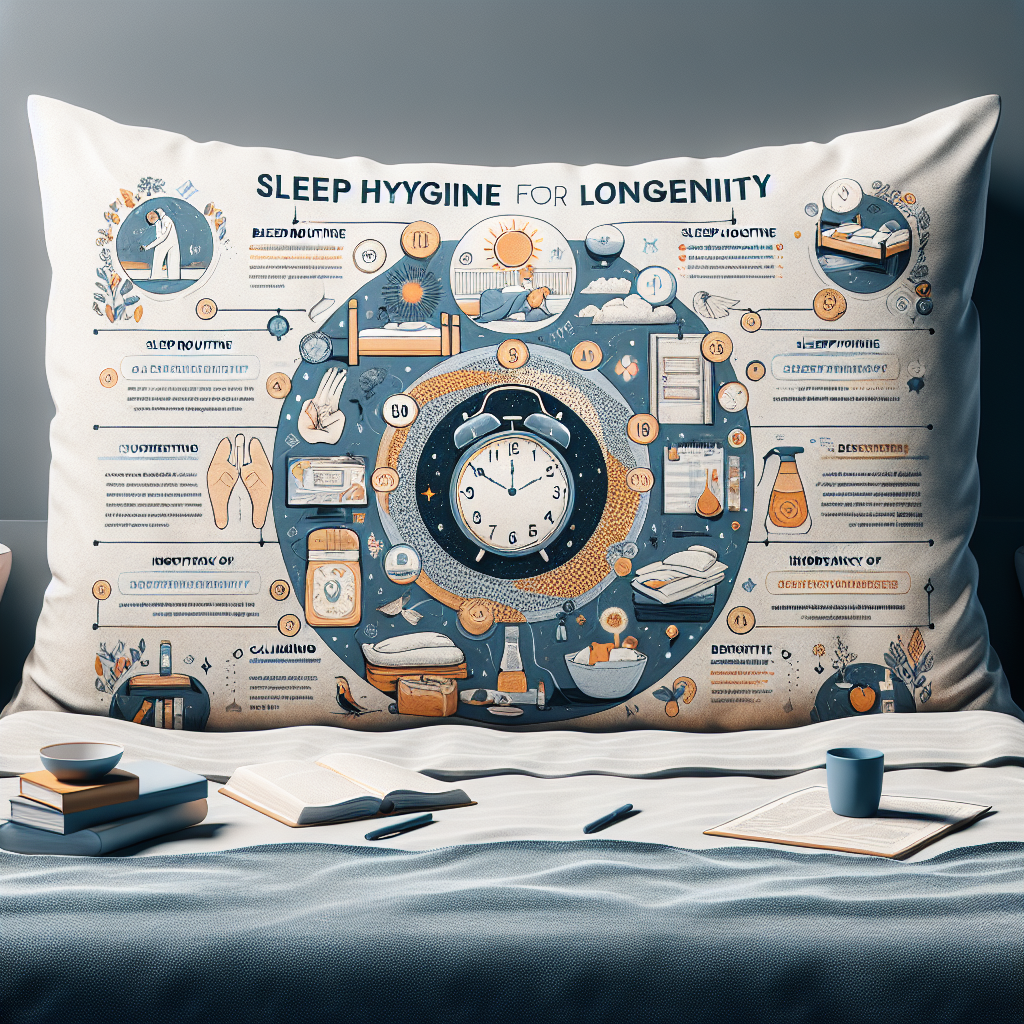Sleep Hygiene for Longevity: How to Create a Restful Routine

Discover the secrets of sleep hygiene for longevity and learn how to create a restful routine. Improve your health and enhance your life span with our comprehensive guide. Click here to start your journey towards a healthier, longer life.
Maximizing Longevity: The Role of Sleep Hygiene in Establishing a Restful Routine
Sleep hygiene, a term that refers to the practices and habits that are necessary to have good nighttime sleep quality and full daytime alertness, plays a crucial role in maximizing longevity. It is a concept that is often overlooked, yet it is a vital component of a healthy lifestyle. The importance of sleep hygiene for longevity cannot be overstated, as it not only contributes to overall health and well-being but also aids in the prevention of various diseases and conditions.
The first step in establishing a restful routine is understanding the importance of sleep. Sleep is not merely a period of inactivity or rest; it is a complex and dynamic process that is essential for our physical and mental health. During sleep, our bodies work to support healthy brain function and maintain our physical health. In children and teens, sleep also helps support growth and development. Lack of sleep can lead to chronic health problems, affect how well you think, react, work, learn, and get along with others.
To create a restful routine, it is essential to maintain a consistent sleep schedule. This means going to bed and waking up at the same time every day, even on weekends or during vacations. This helps regulate your body’s internal clock and can help you fall asleep and stay asleep for the night.
Another critical aspect of sleep hygiene is creating a restful environment. This includes keeping your bedroom quiet, dark, and cool. Consider using room-darkening shades, earplugs, a fan, or other devices to create an environment that suits your needs. Your bed should be comfortable and supportive. If you often wake up with a sore back or an aching neck, you may need to invest in a new mattress or a different pillow.
In addition to these physical factors, it’s also important to pay attention to what you eat and drink. Avoid large meals, caffeine, and alcohol close to bedtime. These can disrupt your sleep cycle and prevent you from falling asleep or staying asleep.
Physical activity is another key component of sleep hygiene. Regular physical activity can help you fall asleep faster and enjoy deeper sleep. Timing is important, though. If you exercise too close to bedtime, it might interfere with your sleep. Spend time outside every day, if possible, and try to exercise regularly.
Lastly, managing stress is an integral part of sleep hygiene. When you have too much to do — and too much to think about — your sleep is likely to suffer. To help restore peace, consider healthy ways to manage stress. Start with the basics, such as getting organized, setting priorities, and delegating tasks. Give yourself permission to take a break when you need one. Share a good laugh with an old friend. These simple steps can help ensure a good night’s sleep and contribute to your overall longevity.
In conclusion, sleep hygiene is a critical aspect of our overall health and longevity. By establishing a restful routine that includes a consistent sleep schedule, a conducive sleep environment, a balanced diet, regular physical activity, and effective stress management, we can significantly improve our sleep quality and, consequently, our health and longevity.
The Connection Between Sleep Hygiene and Longevity: Creating a Restful Routine

Sleep hygiene, a term that refers to the habits and practices conducive to sleeping well on a regular basis, is a critical aspect of overall health and well-being. It is increasingly being recognized for its role in promoting longevity. The connection between sleep hygiene and longevity is a fascinating area of study, with research suggesting that a restful routine can significantly enhance the quality and length of life.
The human body is a complex system that requires regular maintenance to function optimally. Sleep is one of the most important forms of this maintenance. During sleep, the body undergoes various restorative processes, such as tissue repair, memory consolidation, and regulation of hormones that control growth and appetite. A lack of quality sleep can disrupt these processes, leading to a range of health problems, including obesity, diabetes, cardiovascular disease, and even premature death.
The importance of sleep hygiene in promoting longevity becomes clear when we consider the detrimental effects of poor sleep habits. Chronic sleep deprivation, irregular sleep schedules, and sleep disorders can all lead to decreased life expectancy. For instance, studies have shown that individuals who consistently sleep less than six hours per night have a higher mortality risk compared to those who sleep seven to eight hours.
Creating a restful routine is a practical way to improve sleep hygiene and thereby enhance longevity. This involves establishing consistent sleep and wake times, creating a sleep-friendly environment, and adopting behaviors that promote good sleep.
Firstly, maintaining a regular sleep schedule is crucial. Going to bed and waking up at the same time every day helps to regulate the body’s internal clock, known as the circadian rhythm. This rhythm influences various bodily functions, including sleep. By sticking to a consistent sleep schedule, you can enhance the quality of your sleep and reduce the risk of sleep-related health problems.
Secondly, creating a sleep-friendly environment can significantly improve sleep hygiene. This involves ensuring that your bedroom is dark, quiet, and cool. It may also involve investing in a comfortable mattress and pillows. Additionally, it’s important to limit exposure to electronic devices before bed, as the blue light emitted by these devices can interfere with the production of melatonin, a hormone that regulates sleep.
Lastly, adopting behaviors that promote good sleep can further enhance sleep hygiene. This includes regular physical activity, which has been shown to improve sleep quality and duration. It also involves avoiding large meals, caffeine, and alcohol close to bedtime, as these can disrupt sleep.
In conclusion, sleep hygiene is a critical aspect of longevity. By creating a restful routine that involves a consistent sleep schedule, a sleep-friendly environment, and behaviors that promote good sleep, you can enhance your sleep hygiene and thereby promote longevity. While it may require some effort to establish and maintain these habits, the potential benefits to your health and longevity make it well worth the effort. Remember, good sleep is not a luxury, but a necessity for a long and healthy life.
Achieving a Longer Life: The Importance of Sleep Hygiene and a Restful Routine
Sleep hygiene for longevity is a topic that has gained significant attention in recent years. As we delve into the intricacies of human health and longevity, it becomes increasingly clear that sleep plays a pivotal role in our overall well-being. The importance of sleep hygiene and a restful routine cannot be overstated, especially when it comes to achieving a longer, healthier life.
Sleep hygiene refers to the habits and practices that are conducive to sleeping well on a regular basis. It encompasses a variety of factors, including the environment in which we sleep, our pre-sleep routines, and our behaviors during the day. A restful routine, on the other hand, involves establishing a consistent sleep schedule and engaging in activities that promote relaxation and sleep readiness.
The connection between sleep and longevity is well-documented. Numerous studies have shown that individuals who get sufficient, high-quality sleep tend to live longer than those who are chronically sleep-deprived. This is because sleep serves a multitude of essential functions in our bodies. It aids in the repair and restoration of our cells, supports our immune system, and plays a crucial role in memory consolidation and cognitive function.
Moreover, poor sleep hygiene can lead to a host of health problems that may shorten lifespan. Chronic sleep deprivation has been linked to an increased risk of conditions such as obesity, diabetes, cardiovascular disease, and even certain types of cancer. It can also exacerbate mental health issues like depression and anxiety, further underscoring the importance of good sleep hygiene for longevity.
Creating a restful routine is a key component of good sleep hygiene. This involves establishing a regular sleep schedule and sticking to it, even on weekends and holidays. Going to bed and waking up at the same time each day can help regulate your body’s internal clock, making it easier to fall asleep at night and wake up in the morning.
In addition to maintaining a consistent sleep schedule, it’s also important to create a sleep-friendly environment. This means keeping your bedroom dark, quiet, and cool, and investing in a comfortable mattress and pillows. Avoiding screens before bed can also help, as the blue light emitted by phones, tablets, and computers can interfere with the production of melatonin, a hormone that regulates sleep.
Your behaviors during the day can also impact your sleep hygiene. Regular physical activity can promote better sleep, as can avoiding caffeine and alcohol close to bedtime. It’s also beneficial to manage stress, as high levels of stress can interfere with sleep. Techniques such as meditation, deep breathing, and yoga can be helpful in this regard.
In conclusion, sleep hygiene is a critical aspect of longevity. By establishing a restful routine and adhering to good sleep practices, we can enhance our sleep quality and potentially extend our lifespan. While it may require some effort and discipline, the benefits of good sleep hygiene for longevity are well worth it. After all, sleep is not just a luxury, but a necessity for our health and well-being.